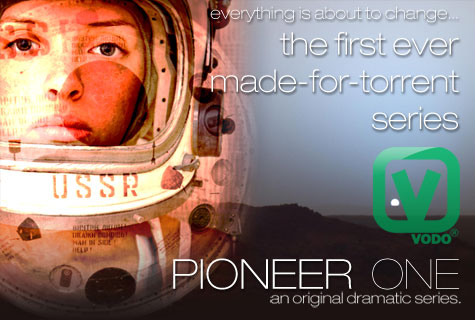I just watched the pilot episode of Pioneer One, the "first ever made-for-torrent" TV series, and I liked it a lot!
The story is intriguing:
An object in the sky spreads radiation over North America. Fearing terrorism, U.S. Homeland Security agents are dispatched to investigate and contain the damage. What they discover will have implications for the entire world.
The pilot episode has been filmed on a budget of a mere 6000 dollars (all of it funded by private donations), and for that, the idea has been very well executed. I suggest you all see it, as the video is freely and legally available through VODO. Pioneer One is licensed under a Creative Commons Attribution Noncommercial Sharealike license.
What I find very impressive about the show is that unlike traditional producers, they embrace rather than demonize P2P file sharing. Therefore, the makers of Pioneer One have the chance to show that grassroots film-making (or rather, TV-series-making) that is successful beyond a tiny scale is possible by actively engaging the Internet community (for both funding and distribution) rather than using the Internet as a simple, tightly controlled broadcasting medium as if it was a glorified TV set.
When the article on Pioneer One faced (and fenced off) a deletion request due to alleged irrelevance on Wikipedia, I wrote the following in the deletion discussion:
Keep. Not for it being a low-funds TV series, as it is not exceptional in that respect, but for its attempt at being successful through Torrent distribution. [...] The main reason for its notability is that we see a huge effort on the side of traditional media distribution groups against P2P networking as a concept. They essentially argue that P2P is [not] tightly controllable and therefore it must be objectionable. Making an active effort to legally distribute media content via P2P is much more a political statement for the legitimacy of P2P as a cultural phenomenon than it is a way to keep distribution cost low. Compare this to other attempts at making a (mini-) series popular on the Internet (Dr. Horrible, for example) that while being free-as-in-beer (initially) did not use P2P technology (or any free-as-in-speech distribution channel), and you'll see how radically different Pioneer One is in that respect. [...]
Sure, it is not the first free-to-torrent project. But it's the first free-to-torrent series that might actually become successful. And it is a way for the filesharing community to show what it is really about: Free speech, not free beer.


